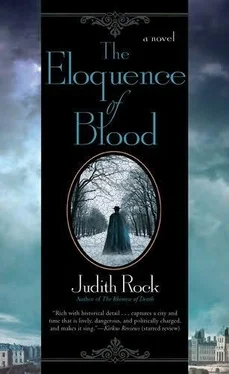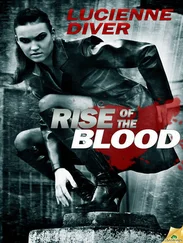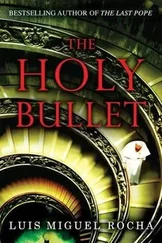Judith Rock - The Eloquence of Blood
Здесь есть возможность читать онлайн «Judith Rock - The Eloquence of Blood» весь текст электронной книги совершенно бесплатно (целиком полную версию без сокращений). В некоторых случаях можно слушать аудио, скачать через торрент в формате fb2 и присутствует краткое содержание. Жанр: Исторический детектив, на английском языке. Описание произведения, (предисловие) а так же отзывы посетителей доступны на портале библиотеки ЛибКат.
- Название:The Eloquence of Blood
- Автор:
- Жанр:
- Год:неизвестен
- ISBN:нет данных
- Рейтинг книги:5 / 5. Голосов: 1
-
Избранное:Добавить в избранное
- Отзывы:
-
Ваша оценка:
- 100
- 1
- 2
- 3
- 4
- 5
The Eloquence of Blood: краткое содержание, описание и аннотация
Предлагаем к чтению аннотацию, описание, краткое содержание или предисловие (зависит от того, что написал сам автор книги «The Eloquence of Blood»). Если вы не нашли необходимую информацию о книге — напишите в комментариях, мы постараемся отыскать её.
The Eloquence of Blood — читать онлайн бесплатно полную книгу (весь текст) целиком
Ниже представлен текст книги, разбитый по страницам. Система сохранения места последней прочитанной страницы, позволяет с удобством читать онлайн бесплатно книгу «The Eloquence of Blood», без необходимости каждый раз заново искать на чём Вы остановились. Поставьте закладку, и сможете в любой момент перейти на страницу, на которой закончили чтение.
Интервал:
Закладка:
“Here, take this, you can sell it, you can-”
But they were gone, expert, like all their kind, at vanishing. Charles slung his cloak around his shoulders, thinking how cold he’d grown without it even for a few moments, and how cold the children must be. Why? he demanded silently of God as he walked. This is Christendom. Our Catholic church is supposed to be reformed now-at least the Protestants have done us that much good, making us look at ourselves. So why do we let children live in the streets? The growing evening quiet of the street remained only quiet.
Most of the vendors in the small roofed stalls along the Pont Neuf were packing up their wares, but a few were still doing business by lantern light. At the weaponer’s, three swaggering, posturing men were trying out swords. Charles barely jumped aside in time to avoid a stumbling experimental thrust, as two of them sparred, laughing.
“Your opponent could have killed you while you were spitting me by mistake,” Charles said laconically to the man who’d nearly skewered him. “Keep track of where your real enemy is, or you’ll be too dead to laugh.”
The man’s eyes narrowed and he moved toward Charles, but his companions roared with laughter and held him back.
At the end of the bridge, Charles headed for the Fosses St. Germain, thinking to go back to Louis le Grand along the old walls’ embankment. Harsh voices behind him made him look over his shoulder and lengthen his stride. The men who’d been trying the swords were closing on him, not with any intent, it seemed, just arguing loudly about the virtues of Spanish steel. To escape their noise, he turned down a short street called Contrescarpe. To his relief, the men stopped, shouting into each other’s faces, and he left them behind.
A coach turned into Contrescarpe at the street’s other end, and he looked for a doorway to shelter in while it passed. But before the coach reached him, it turned right, through an archway, and disappeared. When Charles came to the archway, he saw that it led to an inn whose sign announced it as Le Cheval Blanc. The man begging at the arch held out a hand, and once again Charles had to say he had no coins to give. The White Horse was a rambling stone-built inn with three long-distance coaches standing in its busy yard. A group of beggars moved through the crowd of travelers as grooms changed the teams of horses. Bedraggled passengers clambered out of the newly arrived coach and new passengers boarded the other two. Long-distance coaches were more common now, though Charles himself had never used one. But he knew something from his soldiering days about the state of France’s winter roads, and he pitied the boarding passengers.
As he walked on, another coach turned into Contrescarpe and lumbered toward the inn. Charles scrambled for a door to press his back against. By the time the coach had passed him and rumbled into the innyard, he realized that the door he was leaning against led to a tavern and that inside, people were happily shouting, “Tu es riche? Tu es mort…” The street was slowly filling with early-winter dusk, and a frisson of fear ran down his spine. He walked quickly away, just as the tavern door burst open behind him. Forcing himself not to run, Charles held to his brisk walk, tilting his wide hat slightly and hitching his cassock up a little under his cloak to make him harder to identify from the back as a cleric.
For a dozen steps, he thought he was going to get away with it. Then someone yelled, “There he is, take him!” and feet pounded over the cobbles. Hands grabbed his cloak. He pulled its ties loose, left it to the grabbing hands, and ran. The street was filling with darkness and shouts of “vultures, deathbirds, killers!” A lumbering man with a massive belly came at him from the side and he dodged. But he tripped over uneven cobbles, went down, and someone else jumped on his back. Charles’s body, firmly convinced that alive and doing penance was preferable to dead and virtuous, took over. Flinging up an arm to block a kick to his head, he twisted half onto his side and smashed a fist into the face of the man who’d leaped on him. He scrambled to a crouch and set his back against a house wall. People were running toward him from the innyard, and the street was filling with people fighting each other. As Charles reached to arm himself with a loose cobble, someone swung a piece of wood at him. He ducked, kicking like a madman, and the attacker fell backward. Charles grabbed the piece of wood, swung it in a circle, and got his back against the wall again. A grinning man came at him from the side. Charles swung and the man went down, but the piece of wood hit the house wall, sending a numbing shock up his arms. Two women wrenched it away from him, shrieking with laughter, but other people grabbed them and pulled them back. Then light from the open tavern door glinted on steel and in the instant before the man with the knife lunged, Charles dropped to the ground, swung both legs from the hip, and scythed the man’s feet from under him. A deep voice thundered curses, someone swung a club at the man with the knife, and he lay still on the cobbles.
“Get up,” a pile of rags hissed at Charles. Past questions, he took the hand offered and stumbled to his feet. The pile of rags, also pulling someone along on its other side, hurried him to the end of the street and around the corner into a dark courtyard.
“Stay here!” the rags ordered the other person it had dragged to the courtyard, and turned to Charles. “Are you hurt?”
“No.” After nearly being stabbed, bruises hardly counted.
“They wanted to kill you.”
“Yes.” Charles finally recognized the voice. “It’s Reine, isn’t it?”
“It is.”
“How-where did you come from? And the others?”
She jerked her head at the man beside her, whom Charles could see only dimly in the near dark. “We were begging at the inn. I saw you pass.” She paused and listened, her head on one side. “It’s quieting down, the others will be coming. We have to be away from here. The man who came at you with the knife won’t be getting up again and-”
The half-seen man beside her banged his heavy walking stick on the ground and roared, “By holy Saint Michel, he won’t, the rotting son of a pig!”
It was the deep voice that had cursed so well in the street, and Charles recognized it now as the voice of the reliquary’s attacker and the almsgiving coat snatcher.
“-and because of that, we must be away before the guet comes,” Reine was saying fiercely. The guet was the nighttime police patrol.
A half dozen more beggars had drifted into the yard. Among them Charles spotted the old man’s young keeper, who hurried to his charge’s side. Reine started to lead them all away.
“Wait,” Charles said. “You’ve saved my life. Come to the college and I will feed you, all of you, it’s the least I can do.”
No one spoke or moved. The old man roared out, “Mary’s holy milk, of course we’ll go! And if it’s a trick, we’ll kill him.”
Chapter 15
“They can’t come in here.” Frere Tricot, the usually genial head cook in the lay brothers’ kitchen, was blocking the kitchen doorway with his bulk. Firelight danced across the tonsure age had given him as he shook his head at the beggars. “They’re verminous, see them scratching, even in the cold? You know how hard we work to keep the fleas down. Not to say the lice.”
“Bonsoir, Guillaume.” Reine moved into the light spilling from the doorway and stood beside Charles.
Tricot caught his breath and crossed himself. “Blessed Virgin,” he whispered. “I thought you were dead.”
“I’ve thought so myself, more than once. But never with you.” Her smile widened.
Читать дальшеИнтервал:
Закладка:
Похожие книги на «The Eloquence of Blood»
Представляем Вашему вниманию похожие книги на «The Eloquence of Blood» списком для выбора. Мы отобрали схожую по названию и смыслу литературу в надежде предоставить читателям больше вариантов отыскать новые, интересные, ещё непрочитанные произведения.
Обсуждение, отзывы о книге «The Eloquence of Blood» и просто собственные мнения читателей. Оставьте ваши комментарии, напишите, что Вы думаете о произведении, его смысле или главных героях. Укажите что конкретно понравилось, а что нет, и почему Вы так считаете.












